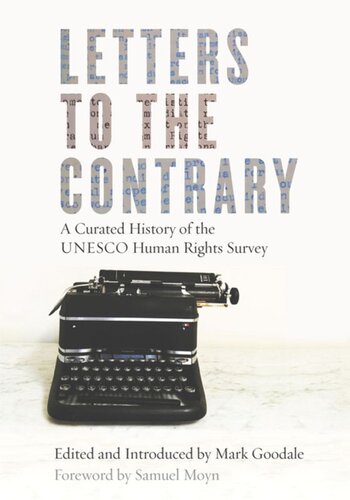

Most ebook files are in PDF format, so you can easily read them using various software such as Foxit Reader or directly on the Google Chrome browser.
Some ebook files are released by publishers in other formats such as .awz, .mobi, .epub, .fb2, etc. You may need to install specific software to read these formats on mobile/PC, such as Calibre.
Please read the tutorial at this link: https://ebookbell.com/faq
We offer FREE conversion to the popular formats you request; however, this may take some time. Therefore, right after payment, please email us, and we will try to provide the service as quickly as possible.
For some exceptional file formats or broken links (if any), please refrain from opening any disputes. Instead, email us first, and we will try to assist within a maximum of 6 hours.
EbookBell Team

4.4
62 reviewsThis remarkable collection of letters reveals the debate over universal human rights. Prominent mid-twentieth-century intellectuals and leaders—including Gandhi, T.S. Eliot, W.H. Auden, Aldous Huxley, Jawaharlal Nehru, and Arnold Schoenberg—engaged with the question of universal human rights. Letters to the Contrarypresents the foundation of the intellectual struggles and ideological doubts still present in today's human rights debates.
Since its adoption in 1948, historians and human rights scholars have claimed that the Universal Declaration of Human Rights was influenced by UNESCO's 1947–48 global survey of intellectuals, theologians, and cultural and political leaders, that supposedly demonstrated a truly universal consensus on human rights. Based on meticulous archival research, Letters to the Contrary provides a curated history of the UNESCO human rights survey and demonstrates its relevance to contemporary debates over the origins, legitimacy, and universality of human rights. In collecting, annotating, and analyzing these responses, including letters and responses that were omitted and polite refusals to respond, Mark Goodale shows that the UNESCO human rights survey was much less than supposed, but also much more. In many ways, the intellectual struggles, moral questions, and ideological doubts among the different participants who both organized and responded to the survey reveal a strikingly critical and contemporary orientation, raising similar questions at the center of current debates surrounding human rights scholarship and practice.
This volume contains letters and survey responses from Jacques Havet, Jacques Maritain, Arnold J. Lien, Richard P. Mckeon, Quincy Wright, Levi Carneiro, Arthur H. Compton, Charles E. Merriam, Lewis Mumford, E. H. Carr, John Lewis, Harold J. Laski, Serge Hessen, John Somerville, Boris Tchechko, Luc Somerhausen, Hyman Levy, Ture Nerman, R. Palme Dutt, Maurice Dobb, Pierre Teilhard De Chardin, Marcel De Corte, Pedro Troncoso Sánchez, Mahatma Gandhi, Chung-Shu Lo, Kurt Riezler, Inocenc Arnošt Bláha, Hubert Frère, M. Nicolay, W. Albert Noyes, Jr., Aldous Huxley, Ralph W. Gerard, Johannes M. Burgers, Humayun Kabir, A. P. Elkin, S. V. Puntambekar, Leonard Barnes, Benedetto Croce, Jean Haesart, F. S. C. Northrop, Peter Skov, Emmanuel Mounier, Maurice Webb, John Macmurray, Julius Moór, L. Horváth, Alfred Weber, Don Salvador De Madariaga, Frank R. Scott, Jawaharlal Nehru, Margery Fry, Isaac Leon Kandel, René Maheu, Albert Szent-Györgyi, Morris L. Ernst, Arnold Schoenberg, W. H. Auden, Melville Herskovits, Theodore Johannes Haarhoff, Ernest Henry Burgmann, Herbert Read, and T. S. Eliot.